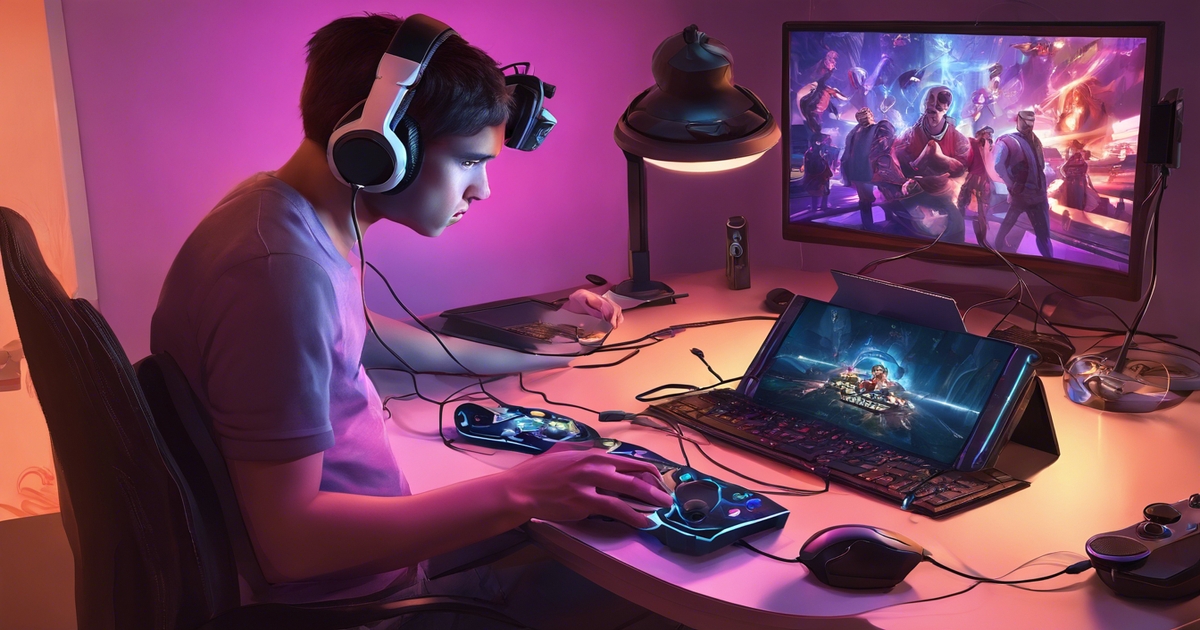Why is Gaming Addictive: Psychology, Symptoms, and Treatment

- Key Takeaways
- Understanding the Psychology Behind Gaming Addiction
- Identifying Behavioral and Emotional Symptoms of Addiction
- Examining the Impact of Gaming on Mental Health
- Recognizing Warning Signs in Gamers
- Analyzing Factors That Increase Game Addictiveness
- Exploring Treatment and Management of Gaming Addiction
- Addressing Gaming Disorder in Young Gamers
- Navigating the Controversy and Misconceptions
- Summary
- Frequently Asked Questions
Ever found yourself immersed in a game, losing track of time? The allure of gaming isn’t just about entertainment; it’s a complex cocktail of psychological and neurological factors. From the adrenaline rush of competition to the sense of accomplishment from leveling up, gaming triggers powerful emotional responses.
But what exactly makes gaming so addictive? Let’s delve into the psychology behind this phenomenon and explore how game developers use clever tactics to keep players hooked.
Key Takeaways
- Understanding the psychological factors contributing to gaming addiction can help individuals and families recognize and address the issue early on.
- Identifying behavioral and emotional symptoms of gaming addiction, such as withdrawal from social activities and mood swings, is crucial for early intervention and support.
- Examining the impact of gaming on mental health underscores the importance of balancing gaming activities with other positive and fulfilling experiences.
- Recognizing warning signs in gamers, such as neglecting responsibilities and losing interest in previously enjoyable activities, can prompt timely intervention and support.
- Analyzing factors that increase game addictiveness, including game design and personal vulnerability, highlights the need for mindful gaming habits and self-awareness.
- Exploring treatment and management of gaming addiction emphasizes the availability of professional help and support systems for individuals struggling with excessive gaming habits.
Understanding the Psychology Behind Gaming Addiction

Role of Dopamine
Dopamine, a neurotransmitter in the brain, plays a significant role in gaming addiction. When individuals engage in gaming, especially when they accomplish tasks or achieve goals within the game, their brains release dopamine. This chemical is associated with pleasure and reward, creating a sense of satisfaction and reinforcing the behavior. As a result, players may feel compelled to continue gaming to experience these pleasurable sensations repeatedly.
Gaming also triggers the brain’s reward system through intermittent reinforcement. This means that rewards are not consistently given but are rather unpredictable. For example, achieving success in a game after multiple attempts can lead to an intense rush of dopamine release due to the unpredictability of such accomplishments.
Social and Psychological Factors
Apart from neurobiological factors, social and psychological aspects contribute significantly to game addicts‘ behavior. Many games today have social components such as multiplayer modes or online communities where players interact with one another. The friendships formed within these virtual worlds can create a strong sense of belonging and community for gamers who might not have similar connections outside of gaming.
Furthermore, psychological factors like stress or dissatisfaction with real-life circumstances can drive individuals towards gaming as a form of escapism. Games offer an alternate reality where players can temporarily escape from their problems and responsibilities while feeling accomplished through achieving milestones within the game world.
Identifying Behavioral and Emotional Symptoms of Addiction

Behavioral Signs
Gaming addiction can manifest through neglecting responsibilities. This could mean skipping homework, neglecting household chores, or ignoring work duties. Individuals may also lose interest in activities they once enjoyed.
Excessive gaming might lead to a decline in academic or professional performance. For instance, someone who used to excel at school may start missing deadlines or performing poorly on tests due to spending excessive time gaming.
Emotional Symptoms
One emotional symptom of gaming addiction is irritability when not gaming. When individuals are unable to play, they may become agitated or restless. They might also experience mood swings and find it challenging to regulate their emotions.
Changes in sleep patterns are another emotional indicator of gaming addiction. Excessive gaming can disrupt normal sleep routines, leading to irregular sleeping hours and inadequate rest.
Individuals addicted to gaming might exhibit signs of hyperarousal – feeling constantly keyed up and on edge – especially when they’re unable to play games for an extended period.
Examining the Impact of Gaming on Mental Health

Cognitive Function
Excessive gaming can impact cognitive function, affecting a person’s ability to think, learn, and remember. When individuals spend long hours gaming, it may lead to decreased attention span and difficulties in concentrating on tasks outside of the game environment. This can affect academic performance and overall productivity. For example, someone who spends several hours playing online role-playing games might struggle to focus during school or work.
Playing video games excessively can also desensitize individuals to real-life experiences due to the constant exposure to virtual environments. This may result in a reduced sensitivity towards emotions and social interactions in reality. As a consequence, gamers might find it challenging to engage with others or experience genuine emotions outside of the gaming world.
Relationship with Anxiety or Depression
The relationship between gaming addiction and mental health problems such as anxiety or depression is well-documented. Individuals who are addicted to gaming often use this activity as a way to escape from real-life stressors or negative emotions. However, excessive gaming can exacerbate these issues by leading to increased feelings of isolation and disconnection from the real world.
Recognizing Warning Signs in Gamers

Isolation from Friends and Family
Gamers who are addicted to gaming may isolate themselves from friends and family for extended periods. They might spend most of their time playing online games or engaging with other multiplayer games on their screens. This isolation can lead to a disconnect from real-life interactions, affecting their social well-being.
This pattern of behavior is concerning because it can indicate an unhealthy obsession with gaming, which takes precedence over maintaining healthy relationships with others. For example, a player spending excessive hours immersed in online worlds while neglecting real-life social activities could be exhibiting signs of addiction.
Neglecting Personal Hygiene and Health
Another warning sign of gaming addiction is the neglect of personal hygiene and health due to excessive gaming. Players engrossed in long hours of gameplay might disregard basic self-care routines such as bathing regularly or eating nutritious meals. The allure of the virtual world can become so consuming that individuals lose sight of essential aspects like maintaining good health.
This neglect not only impacts physical well-being but also mental and emotional wellness. It’s crucial for gamers to strike a balance between screen time and taking care of themselves outside the digital realm.
Decline in Academic or Work Performance
A decline in academic or work performance can be a clear indication that someone is struggling with gaming addiction. When individuals prioritize gaming over responsibilities such as studying for exams or meeting deadlines at work, it can significantly impact their achievements in these areas.
For instance, a student who used to excel academically may start experiencing lower grades due to spending excessive time on multiplayer games instead of focusing on studies. Similarly, an employee’s productivity at work may decrease if they are consistently preoccupied with online gaming during office hours.
Analyzing Factors That Increase Game Addictiveness
In-Game Rewards and Progression Systems
Modern video games are designed with in-game rewards and progression systems that keep players engaged. These rewards, such as unlocking new levels, earning virtual currency, or obtaining rare items, create a sense of accomplishment and satisfaction. As players progress through the game, they experience a continuous stream of achievements that trigger the brain’s reward system. For example, in role-playing games like “World of Warcraft,” players receive experience points for completing quests and defeating enemies, leading to level advancement and access to better gear. This constant reinforcement can lead to addictive behavior as individuals seek more rewards.
The allure of progression systems is evident in various genres, including mobile gaming apps where users collect coins or gems to unlock new characters or abilities. The desire to achieve these milestones keeps players coming back for more gameplay sessions. Some games utilize time-limited events or daily challenges to encourage frequent logins and sustained engagement.
Immersive Nature of Modern Video Games
The immersive nature of modern video games plays a significant role in their addictiveness. Advanced graphics, realistic sound effects, and captivating storylines draw players into richly detailed virtual worlds where they can escape from real-life stressors. For instance, open-world titles like “Grand Theft Auto V” offer expansive environments filled with interactive elements that provide an almost limitless sense of freedom.
Moreover, virtual reality (VR) technology has elevated immersion by allowing players to physically interact with the game environment using specialized equipment like VR headsets and motion controllers. This heightened level of engagement can make it challenging for individuals to disengage from gaming experiences.
Social Connectivity and Competition in Online Gaming
Online multiplayer games foster **
Exploring Treatment and Management of Gaming Addiction
Therapy Options
Seeking professional help is crucial for individuals struggling with gaming addiction. Therapy options, such as cognitive-behavioral therapy (CBT), can be highly effective in addressing the root causes of addiction. CBT helps individuals identify and change negative thought patterns and behaviors associated with excessive gaming.
Counselors or therapists can also provide guidance on developing healthier coping mechanisms to manage stress, anxiety, or depression without resorting to excessive gaming. For instance, they might encourage engaging in physical activities or hobbies outside of playing games to promote a balanced lifestyle.
Support Groups and Counseling Joining support groups specifically tailored for individuals dealing with gaming addiction can offer a sense of community and understanding. Sharing experiences within these groups can provide comfort and motivation to overcome addiction. Moreover, individual or group counseling sessions allow for personalized attention while fostering a supportive environment conducive to recovery.
Setting Limits and Creating Balance In addition to seeking professional help, it’s essential for individuals battling gaming addiction to establish clear boundaries around their gameplay time. This may involve setting specific time limits each day for playing games or designating certain days as “game-free” to focus on other activities.
Furthermore, creating a balanced lifestyle that incorporates various interests beyond playing games is fundamental in managing addictive behaviors effectively. Engaging in social interactions, pursuing hobbies, exercising regularly, or spending quality time with family are all beneficial ways to create balance and reduce the allure of excessive gaming.
Addressing Gaming Disorder in Young Gamers
Setting Boundaries
Parental involvement plays a crucial role in preventing internet gaming disorder in children. By setting clear boundaries and guidelines for gaming, parents can help regulate their children’s gaming habits. For example, limiting screen time and establishing specific periods for gaming can prevent excessive gameplay.
Encouraging Alternative Activities Parents should also encourage their children to engage in alternative activities such as outdoor sports, reading, or creative hobbies. This helps create a balance between gaming and other essential aspects of life, reducing the risk of addiction.
Monitoring Content
Monitoring the content of games is another vital aspect of parental involvement. Parents need to ensure that the games their children play are age-appropriate and do not contain violent or addictive elements. By actively participating in their children’s gaming experiences, parents can guide them towards responsible and healthy choices.
School Programs
Educational initiatives aimed at promoting responsible gaming habits among youth are essential for addressing gaming addiction. Schools can implement programs that educate students about the potential risks associated with excessive gaming while highlighting the importance of moderation.
Community Workshops Organizing community workshops where experts discuss the impact of excessive gaming on mental health can raise awareness among both young gamers and their parents. These workshops provide valuable information on recognizing signs of addiction and seeking help when needed.
Positive Aspects
While it’s important to address the risks associated with gaming addiction, it’s equally crucial to acknowledge the positive aspects of gaming for young individuals. Gaming can enhance cognitive skills, problem-solving abilities, teamwork, and creativity when enjoyed responsibly.
Navigating the Controversy and Misconceptions
Understanding Addiction Beyond Willpower
Gaming addiction is not just a matter of willpower. It involves complex issues that go beyond an individual’s self-control. Factors such as the design of games, social dynamics within gaming communities, and psychological needs play crucial roles in fostering addictive behavior. For instance, game developers often use reward systems and immersive experiences to keep players engaged for extended periods, contributing to potential addictive tendencies.
Passionate gaming differs from addictive behavior. While passionate gamers may dedicate substantial time to their hobby without negative consequences, addictive behavior leads to detrimental effects on various aspects of life. This distinction is vital in understanding that gaming addiction is not solely about having fun or showing interest in a particular activity but rather about the negative consequences it brings.
Debunking Concerns About Violence in Video Games
The concern over violence in video games potentially leading to addiction has been a topic of debate for years. However, research does not conclusively support this notion; instead, it suggests that other areas contribute more significantly to gaming addiction than game content alone. In fact, many people who play violent video games do not develop addictive behaviors related to their gameplay choices.
Summary
Congratulations on reaching the end of this insightful journey into the world of gaming addiction. By understanding the psychological mechanisms at play, recognizing the symptoms, and delving into the impact on mental health, you’ve gained valuable knowledge. It’s crucial to be mindful of warning signs in gamers and the factors that contribute to game addictiveness. Exploring treatment options and addressing gaming disorder in young gamers are essential steps in combating this issue. Navigating through controversies and misconceptions surrounding gaming addiction equips you with a well-rounded perspective.
As you reflect on these insights, consider how you can apply this knowledge in your own life or within your community. Whether it’s identifying potential signs of addiction in a loved one or advocating for responsible gaming practices, your understanding can make a difference. Together, let’s work towards fostering a healthier relationship with gaming for ourselves and those around us.
Frequently Asked Questions
What causes gaming addiction?
Gaming addiction can be caused by a combination of psychological, social, and environmental factors. These may include the immersive nature of games, the desire for achievement and escapism, as well as underlying mental health issues.
How can I recognize if someone is addicted to gaming?
Look out for signs such as neglecting responsibilities, withdrawal from social activities, irritability when not playing, and an inability to control or reduce gaming time. These could indicate addictive behavior that requires attention.
Is gaming addiction treatable?
Yes, gaming addiction is treatable. Treatment often involves therapy to address underlying issues contributing to the addiction and developing healthier coping mechanisms. Support from family and friends also plays a crucial role in recovery.
Are all gamers at risk of becoming addicted?
Not all gamers are at equal risk of developing an addiction. Certain individuals may be more susceptible due to personal vulnerabilities or life circumstances. Factors such as excessive stress or lack of fulfilling activities outside of gaming can increase the likelihood of addiction.
Can children develop gaming addictions?
Yes, children are vulnerable to developing gaming addictions. It’s essential for parents and caregivers to monitor their children’s screen time and behavior closely while encouraging a balanced lifestyle with other activities.
